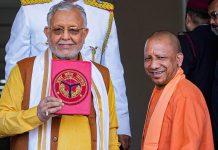
Was the objective to hold a special session of Parliament was only to get the Women’s Reservation Bill passed or was the Modi government trying to create some bigger blast, which it could not do ? A report by Sunny Sharma
The layers of mystery regarding the purpose of the special session of Parliament called by the government are becoming deeper. Was the purpose of the special session only to get the Women’s Reservation Bill passed or was the government trying to create some bigger blast, which it could not do?
Was its purpose to manage headlines by diverting attention from the meeting of India Alliance in Mumbai or something else? The government has deepened this mystery by refusing to provide information under RTI about the President’s order regarding calling the special session and its agenda.
The eyes of the entire country were fixed on the special session of Parliament called between 18th and 22nd September, considering the possibility of something big happening. As the date approached, a sea of speculations began to stir. Then, after the passage of the Women’s Reservation Bill, the session was suddenly adjourned a day earlier, reinforcing the fact that there was actually something else on the agenda of the government. When she could not get it off the ground, the session was suddenly adjourned a day earlier.

To know the same thing, RTI activist PP Kapoor of Panipat filed an RTI in the Ministry of Parliamentary Affairs on 21st September, the day the House was adjourned. In this, he had asked for a copy of the President’s order calling a special session of Parliament from 18 to 22 September and a copy of the agenda along with file noting, so that the country could know why the Modi government had suddenly called this special session. What was the ultimate objective of the government?
In response to this, SS Patra, Central Public Information Officer and Under Secretary, Ministry of Parliamentary Affairs, has given a very shocking answer in his letter dated 26 September. He flatly refused to give the requested information. Referring to Section 8(1)(i) of the RTI Act 2005, he said that the decisions of the Union Council of Ministers, Secretaries and other officers can be made public only after the decision has been taken and the work has been completed.
PP Kapoor expressed surprise over the Indian government’s refusal to provide information and alleged that the Modi government is deliberately hiding very important information of public interest by giving wrong interpretation of the RTI Act. The special session of Parliament, which started on September 18, has ended, but the country does not know why this special session was called. Was there any secret agenda of the government behind this?
The RTI activist said that the decision to call this special session and refusal to give a copy of the agenda shows the arbitrariness and dictatorship of the government. It is also clear from this that the government is hiding the secret behind suddenly calling this special session of Parliament from the public. It seems that this special session was called under some secret agenda, that is why the government is not making the information public.
After announcing the session, the Centre’s denial to spell out the agenda fuelled speculations in political circles speculating about simultaneous elections or a name change of the country to Bharat. The announcement without an agenda triggered a war of words, with the Opposition criticising the government for a lack of transparency and “distorting” parliamentary conventions, while the Centre accused Opposition leaders of “politicising” the functioning of Parliament.
The announcement of the surprise special session generated much curiosity with speculation about the change of name of the country from India to Bharat, fuelled by the repeated use of “Bharat” in multiple official communications during the G20 Summit. There were also murmurs about the possibility of introducing the Women’s Reservation Bill, Uniform Civil Code (UCC), and One Nation One Election, calling for simultaneous Lok Sabha and State Assembly polls across the country.
The special session also saw the formal shifting from the old Parliament building to the new one on September 19. While ambiguity remained over the expectation from the session after the government’s refusal to divulge any details, the government just lined up a discussion on the Parliamentary Journey of 75 years starting from Samvidhan Sabha — Achievements, Experiences, Memories and Learnings along with the presentation of five pending bills. Congress leader Jairam Ramesh credited Sonia Gandhi’s letter to Prime Minister Narendra Modi for making the government concede to announcing the agenda for the special session. Ramesh, however, said that there seems to be nothing substantial on the agenda and that the government could have waited for the winter session of Parliament. He added that Indian National Developmental Inclusive Alliance (INDIA) parties oppose such moves.
TMC Leader, Derek O’Brien tweeted, “Two working days to go before the Special Parliament Session begins and still not a word on the agenda. Only two people know! And we still call ourselves a Parliamentary democracy”. In a subsequent tweet, he wrote, seven hours after this dose, the government puts out an agenda for the Parliament Special Session. However, the agenda has a caveat ‘not to be taken as exhaustive’.
Significantly the new session of Parliament began to see a discussion on Parliament’s 75-year journey and take up for consideration four bills, including one on appointment of election commissioners. In fact the four bills included the Advocates (Amendment) Bill, 2023 that amends the Advocates Act, 1961, while the Press and Registration of Periodicals Bill, 2023 repeals the Press and Registration of Books Act, 1867. Besides, ‘The Post Office Bill, 2023’ has also been listed in the Lok Sabha business. The bill was earlier introduced in Rajya Sabha on 10 August 2023 and it repeals the Indian Post Office Act, 1898.
All said and done, the unusual timing of the session has left everyone wondering, even though the main standout feature on the listed agenda is a special discussion on Parliament’s journey of 75 years starting from the “Samvidhan Sabha” (Constituent Assembly). The government came out with a tentative agenda only when law experts and opposition leaders made their opposition known, suggesting that summoning a Special Session of the Parliament without revealing the agenda is improper and unprecedented.
And now comes the twist with RTI activist PP Kapoor after government’s refusal to give copy of the agenda and file noting of the special session of Parliament alleging the mystery over the motive has deepened. Senior journalist Dhirendra Awasthi observed that it seems that this special session was called under some secret agenda, that is why the government is not making the information public. It is also clear from this that the government is hiding the secret behind suddenly calling this special session of Parliament from the public.












